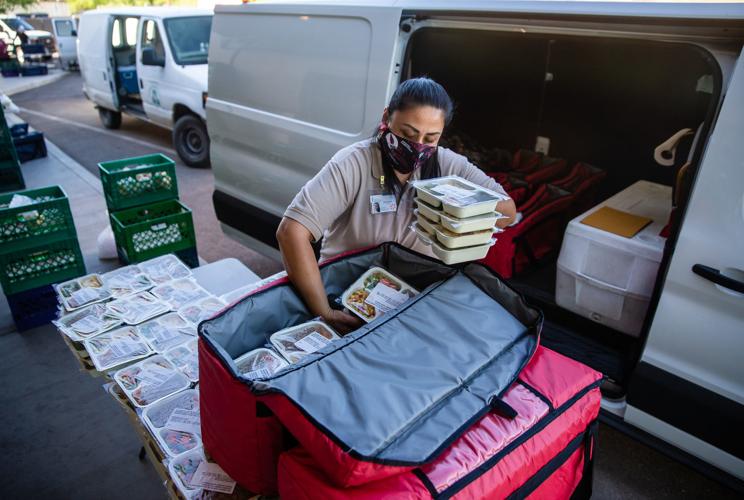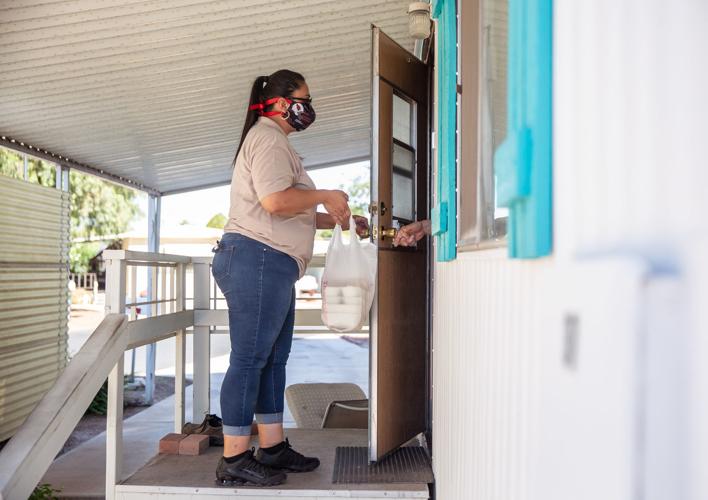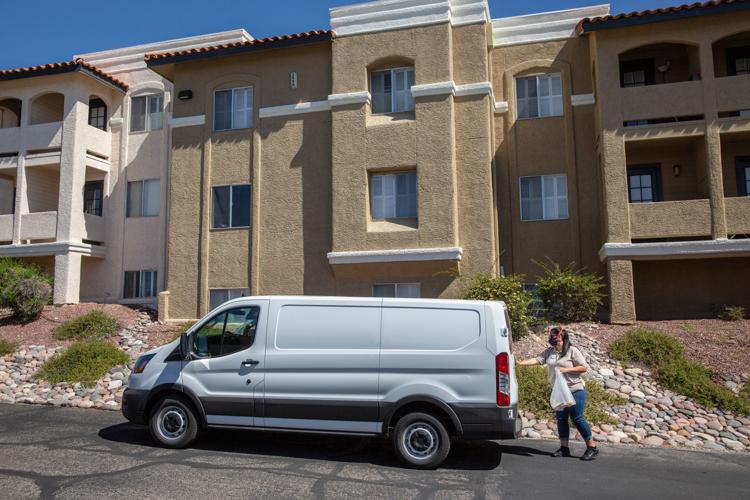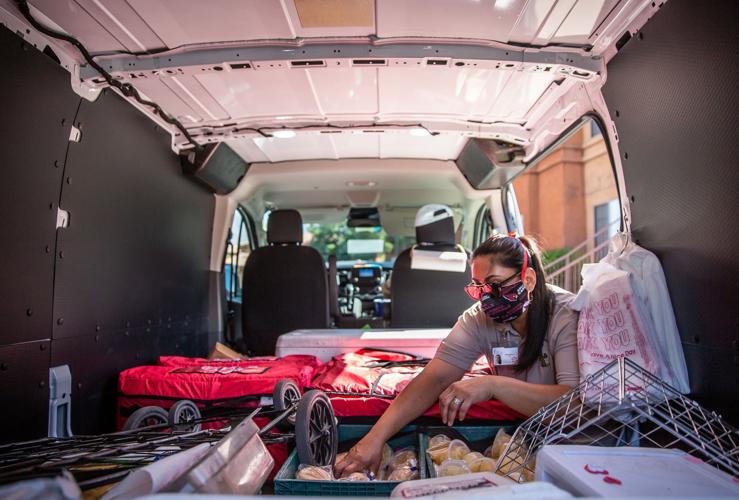Brenda Merino Alvarez pulls her black hair into a pony tail and wears a cloth face mask with emblems of the Arizona Cardinals.
The 38-year-old, wearing jeans and a polo shirt with a Lutheran Social Services of the Southwest in Tucson logo, is gearing up for the 70-mile route she drives four times a week, delivering meals to home-bound elderly and disabled clients.
The nonprofit agency is under contract by Pima Council on Aging to deliver meals through Pima Meals on Wheels.
PCOA serves 894 clients in the county on a $4 million budget. Lu theran Social Services and its other subcontractor, Catholic Social Services, deliver 300,384 meals a year for clients, covering a portion of their food for seven days a week and also leaves supplies of groceries, if needed, during the COVID-19 pandemic, says Antonio C. Estrada, PCOA’s Older Americans Act program director.
Alvarez heads to the Community Food Bank of Southern Arizona’s Caridad Community Kitchen where she disinfects her hands with sanitizer and begins loading a white van with frozen meals for nearly 40 clients.
An ice chest is filled with small milk cartons, and Alvarez sorts the frozen meals, placing them into insulated containers with ice blankets. She moves quickly on a sunny morning, having done this work for nine years.
Once the van is loaded, Alvarez will make her way to Tucson’s north side, Catalina Foothills and Sabino Canyon areas, down to the far southeast side and into the city’s midtown.
The 38-year-old listens to Puerto Rican reggaetón artists Darell and Nio García’s “Llamé Pa’ Verte” (Call me so I can see you) and other artists, including Malucci’s “No es Tuyo” (He is not Yours).
Alvarez’s first stop is a lush, landscaped mobile home park where she greets a man at the door of his home. He is in his 80s, and he takes a bag holding containers of meals including a Denver omelette with spinach, mandarin orange chicken, salisbury steak and a beef bowl along with bread, butter and milk. He smiles and is very thankful.
“For some, I am the only face they actually see,” says Alvarez, a former home caregiver who uses hand sanitizer before and after each meal delivery. “Many of their relatives are out of town so they just talk on the phone. Those who are tech savvy can talk through FaceTime or Skype. But some are losing their eyesight, and others can’t afford the devices. Some don’t have cell phones,” she explains.
Before COVID-19, some clients would invite Alvarez inside. She would visit for a few minutes and make sure they were doing fine, sometimes placing their meals on a counter or in the refrigerator, especially for those with mobility issues.
Another stop was at a luxury rental complex where Alvarez knocks on two doors, leaving food for a man and a woman.
“Some may have had surgeries and need temporary help so they can stay home and not have to go to a rehabilitation facility,” says Alvarez before making her way to a townhouse complex where a woman is bed-bound. The woman’s husband and a caregiver tend to her needs.
Another client at an apartment complex is wheelchair-bound and visits with a roommate, and also receives aid from a caregiver.
Then there is a woman who survived a stroke, but she is paralyzed on her left-side. Her home needs paint, and weeds have overgrown portions of the property. A daughter visits and cleans the home often, but because of her job, she needs help preparing meals for her mother. Her mother walks slowly with a cane and can heat up the easy-to-serve meals Alvarez leaves for her.
There are pockets in the foothills where seniors have lived in their homes for decades. Now that they are old and widowed, some cannot maintain their properties. They have outlived friends and relatives, and their children and grandchildren live out-of-state, says Alvarez.
A frail woman wearing a mask answered the door at another brick house needing paint on its trim and on the wrought-iron screen door. She asks Alvarez to leave the bag by the door and waits until Alvarez climbs into the van before opening the door and picking up the meals that she carries into her home.
“She is scared about the pandemic,” says Alvarez about the woman. “I understand completely, and I want my clients and myself to be safe. I have survived cancer twice. I am high risk because of my pre-existing conditions,” says Alvarez of her bouts with uterine and colon cancer.
Some clients still invite Alvarez in to use the restroom or for a glass of water, but she politely declines. During this pandemic, she stops at convenience stores for bathroom breaks and carries a gallon of water in the van. She also takes salads for lunch, but at times stops at fast-food restaurants.
On this occasion, she stopped at a fast-food restaurant at East Tanque Verde Road and North Catalina Highway. The restaurant did not enforce social distancing between customers in line and no one, including workers, wore face masks.
This bothered Alvarez who quickly ordered her food and washed and sanitized her hands before eating lunch in the van.
“I just don’t understand why people don’t pay attention and wear masks and keep a safe distance between each other,” she says.
Another stop was at Dorothy Pellegrino’s house. The 91-year-old is legally blind and has lived in a ranch-style house near Sabino Canyon since 1966.
“Brenda is a sweetheart. She is terrific,” says Pellegrino, a retired office worker whose husband died in 1990. Before the pandemic, she ate out at restaurants three times a week. Now the home-delivered meals help meet her needs.
Her family lives out of state, and some relatives live in Northern Arizona.
“I have friends who come and visit often. We practice social distancing when we sit outside on the back porch,” Pellegrino says.
Alvarez drives the van, meandering down winding roads in neighborhoods and in to subdivisions and gated communities on Tucson’s southeast side to leave off meals before heading to apartment complexes and public housing for the elderly in midtown.
“I enjoy my job,” says Alvarez. “I get joy because I am able to provide them with a meal and a smile. It lets them know there is somebody out there that does care.”







